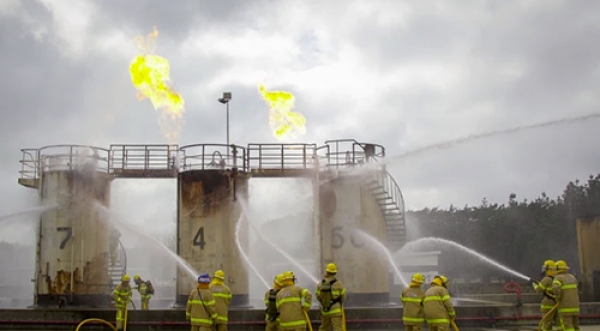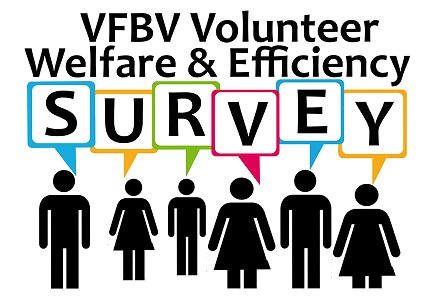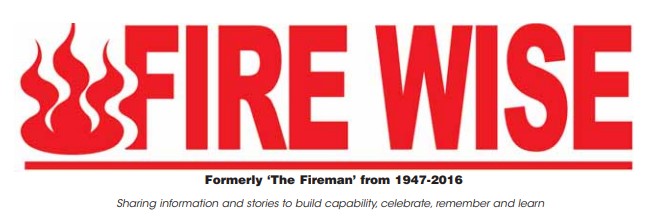Valuable Feedback
By Adam Barnett, VFBV Chief Executive Officer
Over the last few months we have been seeking feedback on the ongoing application of the Chief Officer’s minimum requirements for operational response. Currently these consist of the successful completion of; minimum skills (now known as general firefighter); an annual entrapment drill, and tree hazard awareness course every three years.
And while State Council is yet to consider the feedback and will do so later this month – the feedback aptly demonstrates how broad and varied our membership, brigades and our operating environments are.
Firstly, I want to thank the hundreds of people who took the time to provide feedback. Close to 400 individual responses on behalf of individuals, brigades, groups and district councils makes for a strong sample size, and a really good mix between districts, brigade classifications and the roles of people submitting feedback that will provide a treasure trove of perspectives.
I continue to be impressed by the generosity and willingness of our people to share their thoughts and experiences. Almost all submissions not only directly answered the questions asked but provided additional comments and reasons on why they felt the way they do.
We notice this same generosity throughout our annual Welfare and Efficiency survey, and the qualitative data collected though the comments are always incredibly informative and useful.
It’s what allows us to analyse and interpret the feedback we receive and turn that feedback into valuable guidance and recommendations. Using our own VFBV organisational knowledge and memory, combined with the feedback from the field - we can then provide credible independent advice back to CFA. With senior management demonstrating a renewed commitment to consider and respond to volunteer feedback, the importance of getting involved and being part of the discussions is critical.
The feedback received on the minimum requirements suggest that a large majority of people support the ongoing application of the Chief Officer’s minimum requirements, with 69% indicating unqualified support, and only 7% indicating non-support. An additional 21% indicated support, but also expressed a desire for the requirements to be slightly modified.
When we asked for thoughts on the requirement to conduct an annual entrapment drill, support for the annual requirement rose to 75% support. 11% indicated they would prefer it move to a two-yearly requirement, and 8% advocated for a three-yearly requirement.
You may notice the results don’t always add up to 100%, and this is because the remainder of responses are covered by either “other” or “I don’t know”.
Using the qualitative comments, some strong trends in feedback starts to emerge and is extremely useful to provide context to why people have said what they have.
For example, while the majority of submissions strongly supported the importance that the annual entrapment drill plays in our safety culture, there was very strong feedback on ways in which the process could and should be improved.
Top of the list was greater clarity and better consistency in CFA’s doctrine, procedures and reporting, so that the obligations are clearly understood and communicated. Equally top of the list was the importance of flexibility and for CFA to provide improved support for brigades and members to then meet any of the requirements.
Suggestions for flexibility included aligning expiry dates and moving away from rigid calendar dates to a more practical window aligned with fire seasons. Requests to trust and empower brigade leaders to deal with individual cases where appropriate, as well as greater support to provide more opportunities for members to access opportunities.
There was very critical feedback expressed on how the new general firefighter program has been rolled out, and widely held perceptions of the time it takes to get new recruits on a course, and the inflexible way some districts have gone about scheduling them.
On the suggestion that CFA should consider an option for the entrapment drill refresher to be conducted via an online package, support dropped to only 21%, with 71% of respondents arguing that the nature of the entrapment drill was best suited for practical completion, and the importance of forming muscle memory through practice and repetition.
However equally important is the feedback provided by those who supported an online package, that will enable us to consider the reasons why people preferred this option, and how improvements might be made to accommodate greater flexibility.
The clearest rejection was reserved for the suggestion that perhaps the requirements and frequency of the minimum requirements could be varied depending on the classification of a brigade. For example, could smaller or quieter class 1 brigades perhaps have the flexibility to conduct them less often?
82% of respondents indicated they did not support the basic requirements being varied, with only 18% supporting the suggestion. While opinions on this question fortified the higher the brigade classification of the individual responding, even 71% of respondents from class 1 brigades did not support a variance.
Again, the qualitative comments provide a plethora of suggestions on how smaller brigades could be better supported in meeting the requirements, with the suggestion that rather than lower the requirements, CFA could instead increase the support for those smaller and quieter brigades that would help them achieve the requirements with less impost on member’s time.
The really important point to emerge from the feedback was that while people strongly supported and advocated for greater flexibility, they didn’t want this to come disproportionately at the expense of a minimum level or baseline of consistency.
The more difficult proposition of all the options canvassed was the questions around the requirement to undergo the tree hazard awareness package.
Demonstrating the divergence of views, 41% supported the current requirement to complete the package every three years, while 41% advocated that the package should be completed annually along with the entrapment drill.
Within the feedback and comments of those advocating for tree hazard awareness to become an annual requirement, was an equal push that this does not necessarily mean doing the existing package yearly. There is clearly a recognition that the current package was designed to coincide with the introduction of the new national guidelines, and while intended to bring people up-to-speed on all the new changed terms and symbols, moving to an annual refresher provides an opportunity to shorten and simplify the package to be a true “refresher” that is completed frequently while retaining a slightly larger package that might be conducted less frequently (such as every 3 or 5 years) or when there are significant changes or lessons learned.
We will now investigate and research the various opinions and suggestions made, and also consider what further advice to provide the Chief Officer.
Like all things, this isn’t simply a matter of ‘survey says’ and simply parroting how many people indicated answers between binary options. The value of our work will come from not only understanding the context of the feedback but also the thoughtful and diligent consideration of all the feedback by State Council and other elected volunteer representatives.
They will not only consider the results but will apply a strategic lens across the issues as well as considering practical impacts that may go to the practicability of the arrangements to ensure changes have direct influence on safety outcomes.
It should also be stressed that these are minimum requirements, and nothing prevents brigades who believe they operate in higher risk environments, the choice to offer supplementary opportunities for their members.
I frequently quote the popular saying that there are two things you never want to see being made. Sausages and legislation. At times I jest we should perhaps add ‘consultation’ to this list.
I say that to remind people that genuine consultation isn’t simply about asking a question and then waiting upon a single response. It’s a journey – not a destination, it takes time and sometimes it is difficult and challenging.
Good consultation is about empowering and trusting volunteers to engage with them as equal partners to consider the issue, challenge or opportunity, and that extends well after an initial response comes back.
Robustness is achieved by the proper analysis of the feedback and then consideration of alternatives; providing timeframes that are respectful and appropriate for a volunteer- based organisation; as well as a commitment to show how feedback has been taken into account and considered before decisions or next steps are taken.
Given the divergence of views on some of the topics, I’ll be seeking an iterative process of engagement with the Chief that allows volunteers to further consider the various options suggested.
And at each step, I’m hoping to have the opportunity to come back and seek feedback – especially through District Councils.
Though our actions, I hope to demonstrate the importance of volunteers being involved in our consultative structures and providing feedback when requested.
On this note, I remind members that very shortly, we’ll be launching this year’s VFBV Volunteer Welfare and Efficiency Survey.
The survey is a trusted, reliable and important method used to capture the views of volunteers by volunteers, while also tracking trends in volunteer opinion over the years. And I’d argue there has never been a more important time for volunteers to have their say on how their CFA experience is tracking. And while all your details are confidential, the deidentified results go straight to decision and policy makers.
You can sign up now for pre-registration at the VFBV website on your phone, tablet or computer, or keep an eye out for when its launched. We can even post you a paper copy should you so desire.
Your voice matters and will have an impact on decisions affecting the future. So - if you have not participated in the survey before, make yourself a promise that you won’t let this opportunity pass you by for another year. If you’re not contributing to the feedback, it’s a bit hard to criticise the decisions being made.
In the words of Theodore Roosevelt: “In any moment of decision, the best thing you can do is the right thing, the next best thing is the wrong thing, and the worst thing you can do is nothing.”
Consultation Dashboard

A new landing page has been created on the VFBV website to help members review all current State level policies and procedures that are currently open for formal feedback and consultation.
This page is updated to show current items open, and the dates of when feedback is due, as well as linking to more detail on the relevant topic.
Visit the VFBV website to see the current items open for consultation.
Members are reminded to provide both positive and negative feedback. If we only hear from people who are against a certain policy or position, it is more difficult to assess the broader level of support for particular issues.
Feedback does not need to be long or detailed, but if you do have the time to make substantive comment that is always welcome.
Fiskville Redress Scheme

A reminder of the establishment of a Fiskville Redress Scheme to support Fiskville affected persons.
The scheme is accepting applications from people who had prolonged exposure to toxic substances at the former Fiskville Training College site between 1971 and 2015.
The scheme offers a range of options including a financial payment, and access to mental health counselling and medical health support. You can contact the schemes support team for a confidential discussion or assistance with your application: 1300 315 198 Between 9:00am-4:30pm, Monday-Friday (excluding public holidays) or via This email address is being protected from spambots. You need JavaScript enabled to view it.
The scheme is administered by the Department of Justice and Community Safety and is independent of CFA. To download an application form, or review further information, you can visit https://www.vic.gov.au/redress-fiskville
Survey Pre-Registration

This year’s VFBV Volunteer Welfare and Efficiency Survey is about to open. Volunteers can pre-register now to ensure you are amongst the first to be notified of this year’s survey.
Visit the VFBV website or use the QR code below to register your interest.

Open for Consultation

Formal consultation has commenced on two policies: an updated CFA Child Safety and Wellbeing Policy; and a CFA Asset and Building Naming Policy and Procedure.
VFBV is seeking broad feedback and comment from volunteers in order to inform and assist with VFBV formal responses to these documents. VFBV District Councils have also been invited to lead local discussion at the District level.
Feedback on each of the items currently being consulted on can be provided via your District Council, local VFBV Support Officer or to This email address is being protected from spambots. You need JavaScript enabled to view it. by the dates listed below. VFBV encourages that feedback be provided ASAP so that early submissions can help inform if any additional research needs to be undertaken before a VFBV position is formalised.
CFA Child Safety and Wellbeing Policy
The CFA Child Safety and Wellbeing Policy has been updated to reflect the new Victorian Child Safe Standards that came into effect in 1 July 2022, and are in their six-month transition period.
The new Victorian Standards are more prescriptive than the previous standards, with new minimum standards for each standard that all organisations must meet. Therefore, the CFA policy has been updated to reflect the new requirements.
The updated CFA Child Safety and Wellbeing Policy can be found on the VFBV website for review or from your local District Council.
Feedback on this policy closes 7th November 2022.
CFA Asset and Building Naming Policy and Procedure
The CFA Asset and Building Naming Policy and Procedure proposes to cover arrangements and requirements applying to the future naming of buildings, parts of buildings and other assets such as vehicles.
The CFA Asset and Building Naming Policy and Procedure can be found on the VFBV website from your local District Council.
Feedback on this policy and procedure closes on 30th November 2022.
Joint Committee EOI
Expressions of interest are now open for volunteers to nominate to the CFA/VFBV Joint Committees for the 2023 calendar year.
If you feel you can contribute and have the time, are passionate about one of the eight streams and want to be an integral part of our Joint Committee process – then please visit our website or talk to your local VFBV State Councillor or VFBV Support Officer for a nomination form.
Nominations are due 28 November 2022.
Urban Competition Coaches and Officials Skills Workshop
The Urban Competition and Rules Committee is holding a Coaches and Officials Skills workshop on 13 November 2022 at the Bendigo Competition Track beginning at 9:30am.
The workshop will be facilitated by experienced Judges, Officials and Coaches, with all brigades, competitors and coaches encouraged to attend. The workshops are also targeted at members who are interested in gaining skills to assist in the officiating of local competitions and at the State Championships as well as current and prospective team coaches who want to gain some new skills. Current and future competitors are also welcome to attend to learn from experienced competition coaches and champion competitors.
Judges and officials workshops will cover skills and roles including judge in the box; announcers; on track judging; recorders; starters; marshalling officers and ladder catching. While the coaching workshops will cover the use of the tray in B Section events; rolling on; competitor safety; appliance, marshall and junior events as well as how to run various events.
If you are interested in attend the workshop, please RSVP to the VFBV office via This email address is being protected from spambots. You need JavaScript enabled to view it. or (03) 9886 1141 by Monday 31 October 2022.

Fire Wise – October 2022 online only edition

The October 2022 edition of Fire Wise has been published online only, this edition and past editions are available from the Fire Wise website.
You can support Fire Wise and the role it plays as an independent voice in keeping volunteers informed by becoming a subscriber. To become a Fire Wise subscriber visit the Fire Wise website or contact the Managing Editor of Fire Wise, Gordon Rippon-King either by phone 0402 051 412 or email This email address is being protected from spambots. You need JavaScript enabled to view it.
Recent articles on the VFBV website
Open for Consultation Dashboard
Volunteers welcome Fiskville Redress Scheme
Feedback Requested – Updated CFA Child Safety and Wellbeing Policy
Feedback Requested – Draft CFA Asset and Building Naming
2023 VFBV/CFA Joint Committee District Nominees Expressions of Interest
Enjoy the VFBV monthly newsletter?
If you enjoy reading the VFBV newsletter each month, why not share it with your fellow volunteers?
Either share this page with others who may enjoy the articles or encourage other volunteers to sign up to receive their own copy via email each month here.
 About
About 
